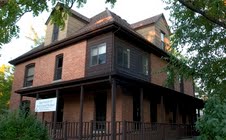History of the Organization
Legal Services of South Central Michigan (LSSCM) is one of the direct service components of the Michigan Advocacy Program. In the early 1960s, communities across Michigan founded local legal aid societies. Four of those organizations – Legal Aid of Central Michigan (Lansing); Jackson County Legal Aid Society; Legal Services Organization of South and Central Michigan (Battle Creek); and the Washtenaw Legal Aid Society—later joined together to form LSSCM.
Since the early 1900s, civil legal aid has been recognized as a valuable service to low income individuals and communities facing critical legal needs. Many volunteer attorneys developed small networks to serve the needs of low income individuals in their communities. It quickly became apparent to the volunteer attorneys that there was a dire need for free civil legal assistance and the need outweighed their ability to provide it on a volunteer basis.

In 1966, Legal Aid offices began receiving federal funding under the Economic Opportunity (“OEO”) Act, as part of the War on Poverty—this changed these organization from being staffed by volunteers from local bar associations to federally funded non-profit law offices.
In 1974, the federal Legal Services Corporation (LSC) was created by Congress as the successor to the OEO. Under the new LSC, legal services became available in every county in the country. Funding from LSC now accounts for approximately 38% of our funding. As part of this federalization process, the Jackson County Legal Aid Society and the Washtenaw County Legal Aid Society merged to form Legal Services of Southeastern Michigan (“LSSEM”).
In 1992, the Family Law Project (which had begun as a student project at the University of Michigan Law School in 1979) merged with LSSCM.
In 1992, the Michigan Supreme Court created the IOLTA (Interest on Lawyers Trust Account) program—the first dedicated funding stream for legal services in Michigan.
In 1993, the Michigan legislature significantly revised the state court filing fees statute to create state funding for legal services programs. Both state funding pools are administered by the Michigan State Bar Foundation.
In 1997, in response to state and federal efforts to reorganize legal services, LSSEM created the Michigan Poverty Law Program and Farmworker Legal Services. In 2000, LSSEM merged with the Battle Creek program. In 2002, LSSEM merged with the Lansing program, creating LSSCM. In 2003, LSC added Livingston County to the LSCCM service area.
LSSCM has also created statewide programs to respond to emerging needs. In 2008, LSSCM created the Michigan Foreclosure Prevention Project and the Michigan Immigrant Rights Center. In 2011, LSSCM created the Michigan Elder Justice Initiative. In 2012, MPLP launched the Michigan Legal Help Program, a statewide website (michiganlegalhelp.org) and affiliated self-help centers which contain legal information and referral resources for people who have to represent themselves in simple civil legal matters.
In 2014, LSSCM changed its name to the Michigan Advocacy Program and created a separate LLC to house the statewide advocacy services, Michigan PLP, LLC. The statewide advocacy services include the Michigan Poverty Law Program, the Michigan Immigrant Rights Center, Michigan Elder Justice Initiative, and Michigan Legal Help Program.
Since the early 1960s, LSSCM and its predecessors have been leaders—in the state and nationally—in the delivery of quality representation to low income individuals. LSSCM has provided a high volume of quality individual advocacy and has engaged in policy advocacy that has improved the systems that directly impact poor people.